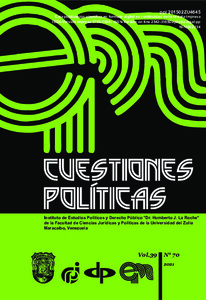Please use this identifier to cite or link to this item:
http://elar.tsatu.edu.ua/handle/123456789/15416Full metadata record
| DC Field | Value | Language |
|---|---|---|
| dc.contributor.author | Crespín-Quimí, P. | - |
| dc.contributor.author | Ordóñez-Barcia, S. | - |
| dc.contributor.author | Lalangui-Sarango, R. | - |
| dc.contributor.author | Nesterenko, Olena | - |
| dc.contributor.author | Нестеренко, Олена Миколаївна | - |
| dc.contributor.author | Нестеренко, Елена Николаевна | - |
| dc.date.accessioned | 2021-10-11T08:47:20Z | - |
| dc.date.available | 2021-10-11T08:47:20Z | - |
| dc.date.issued | 2021 | - |
| dc.identifier.uri | http://elar.tsatu.edu.ua/handle/123456789/15416 | - |
| dc.description.abstract | ES: En este artículo se realiza un análisis del discurso de Foucault para comprender la formalización de ciertos dispositivos han fundado una gramática de la dominación, expresada en las relaciones entre el poder sobre los cuerpos (el Biopoder) y el ejercicio de la ciudadanía. Aunque el propósito es eminentemente teórico, se pretende lograr una aproximación factual al caso latinoamericano, en el entendido que las democracias de la región son hijas dilectas de la modernidad y, además, de los esquemas gubernamentales que privilegian la figura del ciudadano como actor político y sujeto histórico. Metodológicamente se realiza un análisis crítico-hermenéutico, desde el cual se trata, de visibilizar las estrategias de dominación e interpretar en la teoría de Foucault, la instauración discursiva de un nuevo orden societal, basado en la narrativa que relaciona poder y ciudadanía. Estudio permite concluir que, las categorías teóricas foucaultianas, develan al poder como un conjunto de relaciones, siempre en tensión, que, en épocas de cambios, siempre haya espacio, para construir nuevas reglas y regímenes de existencia. EN: In this article, an analysis of Foucault’s discourse is carried out to understand the formalization of certain devices that have founded a grammar of domination, expressed in the relationships between power over bodies (Biopower) and the exercise of citizenship. Although the purpose is eminently theoretical, it is intended to achieve a factual approach to the Latin American case, in the understanding that the democracies of the region are beloved daughters of modernity and, in addition, of government schemes that privilege the figure of the citizen as a political actor and historical subject. Methodologically, a critical-hermeneutical analysis is carried out, from which it is a matter of making domination strategies visible and interpreting in Foucault’s theory, the discursive establishment of a new societal order, based on the narrative that relates power and citizenship. Study allows us to conclude that Foucaultian theoretical categories reveal power as a set of relations, always in tension, that, in times of change, there is always room to build new rules and regimes of existence. | uk |
| dc.language.iso | en | uk |
| dc.relation.ispartofseries | Cuestiones políticas;Vol. 39, № 70 (P. 352-367) | - |
| dc.subject | Biopoder | uk |
| dc.subject | Biopolítica | uk |
| dc.subject | ciudadanía | uk |
| dc.subject | América Latina | uk |
| dc.subject | Foucault | uk |
| dc.subject | Biopower | uk |
| dc.subject | Biopolitics | uk |
| dc.subject | citizenship | uk |
| dc.subject | Latin America | uk |
| dc.title | Biopoder y ciudadanía en América latina. Una lectura desde Foucault | uk |
| dc.title.alternative | Biopower and citizenship in Latin America. A reading from Foucault | uk |
| dc.type | Article | uk |
| local.identifier.doi | 10.46398/cuestpol.3970.22 | uk |
| Appears in Collections: | Кафедра Менеджменту та публічного адміністрування | |
Files in This Item:
| File | Description | Size | Format | |
|---|---|---|---|---|
| 36854-Texto del artículo-65804-1-10-20211005.pdf | 533.57 kB | Adobe PDF |  View/Open |
Show simple item record
CORE Recommender
???jsp.display-item.check???
Items in DSpace are protected by copyright, with all rights reserved, unless otherwise indicated.
